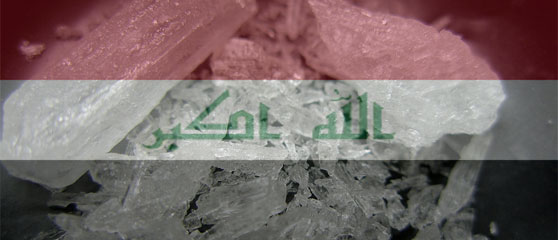Problematic methamphetamine use and production are on the rise in Iraq, and regional instability is preventing the state from responding effectively.
Unregulated meth production is a two-pronged threat to Iraq; there are insufficient health services to assist people who are problematically using the drug, while efforts to counter trafficking groups are weakening the already strained security forces.
In November, the Iraqi National Security Agency (NSA) discovered methamphetamine (“meth”) labs in Basra and the south-eastern province of Maysan. Al Ghad, an independent Jordanian newspaper, quotes an anonymous NSA source as asserting that "criminal gangs [are] transforming Iraq from a transit country to a [producer] country".
Ali Hassan Kamel, an Iraqi magistrate, told Al Sumaria News in December that meth continues to enter Iraq from neighbouring countries, but that people in Iraq have also learned how to produce the drug themselves.
Kamel warns that increased domestic production is exacerbating problematic use. There is an ongoing “steady increase [in the number of] drug cases”, he claims, and the majority involve “the abuse of crystal [meth] … in impoverished [and] densely populated areas”.
Data on drug use is scarce, although authorities’ reports on seizure quantities suggest a rise in the amount of meth within the country.
Abdul Karim Mustafa, chief of police in the province of Basra, told Sot Al-Iraq News that "more than 83 kilograms of narcotic substances" – primarily meth and cannabis – were seized by security forces in the province between January and August 2016. This marked a steep rise on the 7.3 kilograms seized there in the entirety of 2015.
This rise may be attributable to increased domestic meth production, which is unusual for Iraq.
Iraq has traditionally been a transit country in international drug trafficking, including the trade of meth, which the US Department of State blames on Iraq’s “uncontrolled and porous borders” with Iran and Syria.
Domestic authorities fear that the chaos caused by ongoing violence in the country – particularly conflict with ISIS – is providing fertile ground for illegal drug production.
The consequences of this rise are compounded by the dearth of harm reduction and drug treatment services in Iraq, access to which has worsened in recent years.
In 2008, the World Health Organisation reported that community-based sterile needle programmes were available for people who inject drugs. However, according to the Middle East and North Africa Harm Reduction Association (MENAHRA), these were discontinued by 2012.
Dr. Aqeel Al-Sabagh, a psychiatrist who opened a mental health centre in Basra, told the Iraq Press Agency in early January 2016 that his facility is unable to assist the "growing [rates of meth] abuse among young people, adolescents, [and] college students” in Basra province. He called on the government to establish a specialised mental health centre in the province to help people who are unable to overcome their problematic use.
Dr. Al-Sabagh said that his centre is unable to treat many patients who arrive with problematic drug use, so they are being sent to Baghdad’s Ibn Rushd Psychiatry & Addiction Hospital – the only dedicated drug treatment facility in Iraq, which only has space for 74 in-patients.
The Ministry of the Interior has called for the creation of a new committee, including representatives from the country's security agencies, to combat domestic meth production and the illegal importation of precursor chemicals.
The ability of the government to eradicate drug trafficking seems almost implausible, as it does not even have political control over many parts of the country. Reducing the harms of drug use, however, is something the government may be more capable of doing.


